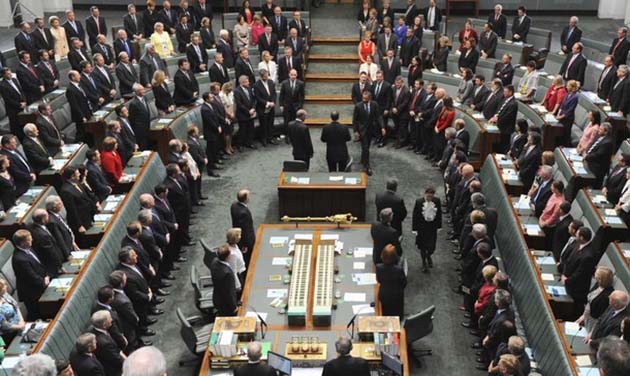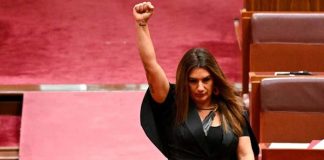The nature of parliament exerts conservative pressures on left-wing MPs, as the history of sending them into parliament shows, writes James Supple
Most people who want change look to parliament to achieve it. We are told the parliament is a democratic body that can represent everyone’s interests.
But the history of electing radical reformers to parliament has been a disappointment. The Labor Party started out in the 1890s with the aim of running parliament in the interests of working class people. Today it obsessively courts the approval of big business.
The Greens too, now that they have gained more seats federally, face a conservative pull to become “respectable” parliamentary players, willing to strike deals with the major parties and tone down their policies. Current leader Richard di Natale personifies this drift.
The history of sending left-wing MPs into parliament shows that without strict control of the MPs by a mass membership party, even the most principled MPs face pressures that will pull them to the right.
It is not enough for MPs to be answerable simply to voters. The parliamentary system is designed so that MPs are only up for re-election once every three or four years. In between elections they are basically unaccountable to voters. It is only their political parties that provide even the semblance of regular meetings and mechanisms that can attempt to hold them accountable.
The whole air of parliament encourages MPs to believe they are part of the elite. They receive wages way beyond those of the average worker, of $200,000 for a federal backbencher, plus their own staff and a raft of expenses.
So many of them begin to believe that they know best, and do not need to always be accountable to ordinary party members or the people who elected them.
The issue of MPs’ accountability has surfaced recently in The Greens’ preselection for the NSW upper house.
Some of the existing NSW upper house MPs, Jeremy Buckingham and Jan Barnham in particular, have refused to accept decisions of the party as binding on them. Buckingham is campaigning to get rid of the more left-wing leadership of the NSW branch and move it to the right.
There is a similar problem in Federal Parliament, with The Greens “party room”, as the parliamentary caucus likes to call itself, often making decisions without reference to the wider party and arguing for policy changes within party forums.
A similar tension between party members and MPs is playing out within the British Labour Party, with the parliamentary party waging war on new left-wing leader Jeremy Corbyn.
After Corbyn was elected leader through a direct vote of party members last year, his parliamentary colleagues have sought to undermine him at every opportunity.
At stake is his desire to turn British Labour into an anti-austerity and anti-war party, and break with the surrender to Thatcherism that has been triumphant in the party at least since Tony Blair became leader in 1994.
When Corbyn refused to resign as leader after less than a year in the role, the bulk of his shadow Ministry resigned and declared no confidence in him, forcing a new leadership ballot for the second time in two years. His opponent in the leadership race, Owen Smith, gained the formal nomination of fully 70 per cent of the party’s MPs.
Labor’s formation
These problems raised their head right from the inception of the first modern political party in Australia, the Labor Party.
The early history of Labor Party politics in Australia showed that MPs, once in parliament, frequently refused to adhere to the principles and policies they had been elected to champion.
It was NSW that made the running in establishing a Labor Party and winning parliamentary seats. Angus Cameron, the first MP in NSW sponsored by the Trades and Labour Council (TLC), was elected in 1874. He was a prominent unionist who had been the TLC’s secretary.
The unions raised funds to pay him a wage, as MPs at the time were unpaid, ensuring only rich men could stand. But within 18 months he renounced any idea that the trade union movement could control how he voted, and the TLC stopped his salary.
It was only after the crippling defeat of the 1890 maritime strike that the unions again turned seriously to standing parliamentary candidates.
The strike was a decisive defeat for the working class, involving unions among dock workers, coal miners and shearers across the Australian colonies. The colonial governments helped to crush the strike, with workers arrested and jailed for up to six months and the military mobilised for use against strikers.
As Vere Gordon Childe explained in his classic study How Labour Governs, “The workers had been defeated by the use of the government machinery in the hands of the master class; but in a democratic country, where every man had a vote and the workers outnumbered the employers, there seemed no reason why they should not wrest the machinery from the master’s hands and control it themselves.”
The unions drew up a detailed “platform” of policies that candidates had to promise to uphold and made it clear that elected MPs were expected to sit together as a third party, in order to trade their votes for concessions from the major parties.
The new party won 35 out of 171 seats in the 1891 election, giving them the balance of power. But at its very first parliamentary caucus meeting, eight of them refused to vote according to caucus decisions.
Worse was to come. The following year a major strike erupted in the mines at Broken Hill. Seven of the miners’ leaders were arrested and sentenced to jail. Government efforts to use the police and courts against strikers had been one of the key reasons for the unions’ decision to run parliamentary candidates.
The TLC executive instructed the Labour MPs to bring down the government over its handling of the strike. But 11 of them refused, and the government survived. Their number included not just those already shown to be unreliable, but a number of established trade union leaders sent into parliament.
As a result, a party conference in 1893 reaffirmed that, in future, Labor MPs should vote according to the party platform and support common caucus decisions to vote as a block. The unions saw this as the only way to ensure their MPs operated as representatives of the labour movement, not as individual careerists.
The MPs revolted, with only four of them accepting the terms. The other 31 MPs were expelled and refused union endorsement and support. The motion passed at the conference, demonstrating the level of the disgust with the MPs, held, “That they be regarded as traitors to the sacred cause they were elected to support, and treated with undying hostility”.
One of them, Joseph Cook, ended up as a Government Minister for one of the old capitalist parties.
Nor was this episode the end of the problems. When a Labor government won power in NSW for the first time in 1910, with a slim majority, two MPs held the party to ransom by threatening to resign over the issue of selling off Crown land. The party’s policy was to oppose further sales, but the result was that the government backed down.
And this was just the first of a series of betrayals where the government refused to implement party policy, over abolishing the upper house (then unelected), and establishing a state-run steel works.
Vere Gordon Childe catalogued the disappointments of those who founded the party.
He explained that, “The fact is that, possessed of a substantial salary, a gold pass on the railways and other privileges, and surrounded by the middle class atmosphere of parliament, the workers’ representative is liable to get out of touch with the rank and file that put him in the legislature, and to think more of keeping his seat and scoring political points than of carrying out the ideals he was sent in to give effect to.”
Going into government
The difficulties grew once Labor started to form governments and take responsibility for running the state. This inevitably meant betraying its supporters. Time and time again Labor has chosen to side with capitalism and big business, instead of serving the interests of its working class supporters.
During the First World War in 1916 sitting Labor Prime Minister Billy Hughes was expelled, after he attempted to introduce conscription in defiance of the unions and the party. Conscription was the straw that broke the camel’s back, after Hughes had refused to deliver on a whole series of reforms sought by the unions, such as price controls to keep the cost of living under control during the war.
But for Hughes, the interests of big business in Australia in backing the British war effort and sustaining their profits came first. Hughes took a number of MPs with him to split the Labor Party, forming a coalition government with the conservatives.
One hundred years on, Labor in Australia has degenerated to the point where the MPs frequently defy the wishes of the unions and party membership and get away with it.
Participating in government and parliamentary deal making inevitably means taking responsibility for implementing cuts and austerity.
Parliament exists as a mechanism for running a capitalist state. Its role is to promote capitalist economic growth and ensure that big business can continue making healthy profits and investments.
But even a party that seeks to use parliament as a platform to build support for workers’ struggles and movements for social change must enforce a tight discipline and control over its MPs.
Labor’s failure should serve as a warning: without firm party control and a focus on using parliament to build wider grassroots struggles, the pressure to be “responsible” parliamentary players and help manage capitalism will pull both Greens MPs, and their party as a whole, to the right.






